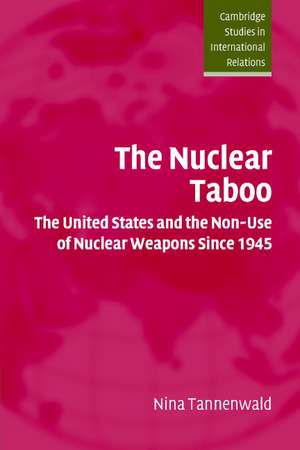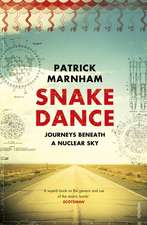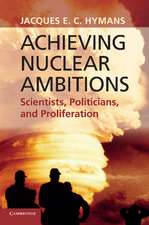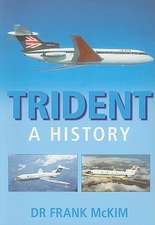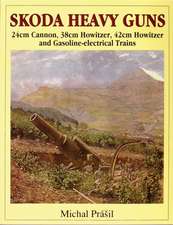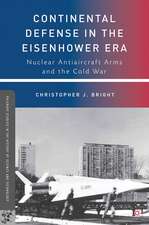The Nuclear Taboo: The United States and the Non-Use of Nuclear Weapons Since 1945: Cambridge Studies in International Relations, cartea 87
Autor Nina Tannenwalden Limba Engleză Paperback – 19 dec 2007
| Toate formatele și edițiile | Preț | Express |
|---|---|---|
| Paperback (1) | 278.72 lei 6-8 săpt. | |
| Cambridge University Press – 19 dec 2007 | 278.72 lei 6-8 săpt. | |
| Hardback (1) | 758.75 lei 6-8 săpt. | |
| Cambridge University Press – 19 dec 2007 | 758.75 lei 6-8 săpt. |
Din seria Cambridge Studies in International Relations
-
 Preț: 198.90 lei
Preț: 198.90 lei -
 Preț: 232.37 lei
Preț: 232.37 lei -
 Preț: 237.58 lei
Preț: 237.58 lei -
 Preț: 210.70 lei
Preț: 210.70 lei -
 Preț: 190.01 lei
Preț: 190.01 lei -
 Preț: 200.87 lei
Preț: 200.87 lei - 8%
 Preț: 401.24 lei
Preț: 401.24 lei -
 Preț: 229.56 lei
Preț: 229.56 lei -
 Preț: 265.70 lei
Preț: 265.70 lei -
 Preț: 200.09 lei
Preț: 200.09 lei -
 Preț: 207.82 lei
Preț: 207.82 lei -
 Preț: 158.77 lei
Preț: 158.77 lei -
 Preț: 162.49 lei
Preț: 162.49 lei -
 Preț: 231.47 lei
Preț: 231.47 lei - 11%
 Preț: 584.77 lei
Preț: 584.77 lei -
 Preț: 241.77 lei
Preț: 241.77 lei -
 Preț: 287.87 lei
Preț: 287.87 lei -
 Preț: 209.13 lei
Preț: 209.13 lei -
 Preț: 299.23 lei
Preț: 299.23 lei -
 Preț: 286.13 lei
Preț: 286.13 lei -
 Preț: 287.87 lei
Preț: 287.87 lei - 11%
 Preț: 641.67 lei
Preț: 641.67 lei - 11%
 Preț: 585.78 lei
Preț: 585.78 lei - 14%
 Preț: 843.23 lei
Preț: 843.23 lei -
 Preț: 303.80 lei
Preț: 303.80 lei -
 Preț: 200.79 lei
Preț: 200.79 lei -
 Preț: 284.78 lei
Preț: 284.78 lei -
 Preț: 279.76 lei
Preț: 279.76 lei -
 Preț: 285.75 lei
Preț: 285.75 lei -
 Preț: 324.24 lei
Preț: 324.24 lei -
 Preț: 290.16 lei
Preț: 290.16 lei -
 Preț: 291.69 lei
Preț: 291.69 lei -
 Preț: 392.52 lei
Preț: 392.52 lei -
 Preț: 315.99 lei
Preț: 315.99 lei
Preț: 278.72 lei
Nou
Puncte Express: 418
Preț estimativ în valută:
53.33€ • 57.03$ • 44.47£
53.33€ • 57.03$ • 44.47£
Carte tipărită la comandă
Livrare economică 18 aprilie-02 mai
Preluare comenzi: 021 569.72.76
Specificații
ISBN-13: 9780521524285
ISBN-10: 0521524288
Pagini: 472
Dimensiuni: 152 x 228 x 27 mm
Greutate: 0.66 kg
Editura: Cambridge University Press
Colecția Cambridge University Press
Seria Cambridge Studies in International Relations
Locul publicării:Cambridge, United Kingdom
ISBN-10: 0521524288
Pagini: 472
Dimensiuni: 152 x 228 x 27 mm
Greutate: 0.66 kg
Editura: Cambridge University Press
Colecția Cambridge University Press
Seria Cambridge Studies in International Relations
Locul publicării:Cambridge, United Kingdom
Cuprins
1. Introduction: the tradition of nuclear non-use; 2. Explaining non-use; 3. Hiroshima and the origins of the nuclear taboo; 4. The Korean War: the emerging taboo; 5. The rise of the nuclear taboo, 1953–1960; 6. Nuclear weapons and the Vietnam War; 7. Institutionalizing the taboo, 1960–1989; 8. The 1991 Gulf War; 9. The taboo in the post-Cold War world; 10. Conclusion: the prospects for the nuclear taboo.
Recenzii
'At a time when the actual use of nuclear weapons is being contemplated as 'mini-nukes' or 'bunker-busters', Nina Tannenwald's book is a timely reminder of humanity's visceral recoiling from the use of the world's most destructive weapon.' Jayantha Dhanapala, Former United Nations Under-Secretary-General for Disarmament Affairs and former Ambassador of Sri Lanka to the USA
'The Nuclear Taboo is a compelling account of the role of moral restraint in international politics. Tannenwald explains how the habit of non-use has become expected and required behavior, reminding us that there was nothing inevitable about it. She traces the historical trajectory and effect of the taboo on international power politics. She also raises perhaps the most important war-related issue of our time: will the nuclear taboo be broken in light of new technologies and new threats? Read this book and find out how beliefs about right and wrong conduct have shaped the choices of policy makers and the expectations of the public. No explanation of international politics in the nuclear age will be complete without it.' Joel H. Rosenthal, President, Carnegie Council on Ethics and International Affairs
'Nina Tannenwald has written a powerful and provocative book examining the influence of ethical norms on U.S. leaders' nuclear weapons decisions. Her thesis that a nuclear taboo has taken hold will be widely read and hotly debated in both university classrooms and inside defense ministries in all nuclear nations.' Scott D. Sagan, Stanford University
'The Nuclear Taboo is a compelling account of the role of moral restraint in international politics. Tannenwald explains how the habit of non-use has become expected and required behavior, reminding us that there was nothing inevitable about it. She traces the historical trajectory and effect of the taboo on international power politics. She also raises perhaps the most important war-related issue of our time: will the nuclear taboo be broken in light of new technologies and new threats? Read this book and find out how beliefs about right and wrong conduct have shaped the choices of policy makers and the expectations of the public. No explanation of international politics in the nuclear age will be complete without it.' Joel H. Rosenthal, President, Carnegie Council on Ethics and International Affairs
'Nina Tannenwald has written a powerful and provocative book examining the influence of ethical norms on U.S. leaders' nuclear weapons decisions. Her thesis that a nuclear taboo has taken hold will be widely read and hotly debated in both university classrooms and inside defense ministries in all nuclear nations.' Scott D. Sagan, Stanford University
Notă biografică
Descriere
An examination of why the United States has not used nuclear weapons since 1945.
